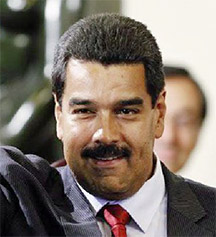CARACAS, (Reuters) – Venezuelan President Nicolas Maduro yesterday eliminated the National Assembly’s control over nomination and removal of central bank directors through a legal reform that the opposition slammed as aimed at curtailing its power a day before it takes leadership of the legislature.

Venezuela’s opposition trounced the ruling Socialist Party and its allies in legislative elections in December, winning two-thirds of the Congress, in large part due to voter fury over a brutal economic crisis.
In a televised speech last night, Maduro said he may ask the National Assembly to approve an “economic emergency.”
One of the opposition’s key economic aims was to try to overhaul the central bank amid triple-digit inflation, recession and widespread shortages. Opposition lawmakers-elect had vowed to pressure the bank into revealing data on inflation and gross domestic product, neither of which has been published for more than a year.
“The reform is a legal monstrosity to protect a highly questioned president. It goes against the constitution,” Jose Guerra, a newly elected opposition lawmaker and a former director of the central bank, wrote on Twitter.
Maduro, in his televised speech, said: “I’m evaluating the strengthening of a strategic plan. … We are going to activate an emergency plan and reconstruct our economy.” He provided no further details.
The law previously required the president to seek the approval of Congress when naming or firing central bank directors. This power now rests in the hands of the president following the change to the law, which was signed on Wednesday.
The outgoing Congress had granted Maduro special powers to legislate by decree until Dec. 31.
The last-minute change also allows the bank to classify data if it is considered a threat to national security or economic stability, and allows it to allocate financing to the state and its institutions without legislative approval.
Since the Dec. 6 vote, the ruling Socialist Party has sought to curtail the opposition’s power, with the latest move suggesting Venezuela’s economic health will remain under wraps while granting the central bank more autonomy.
